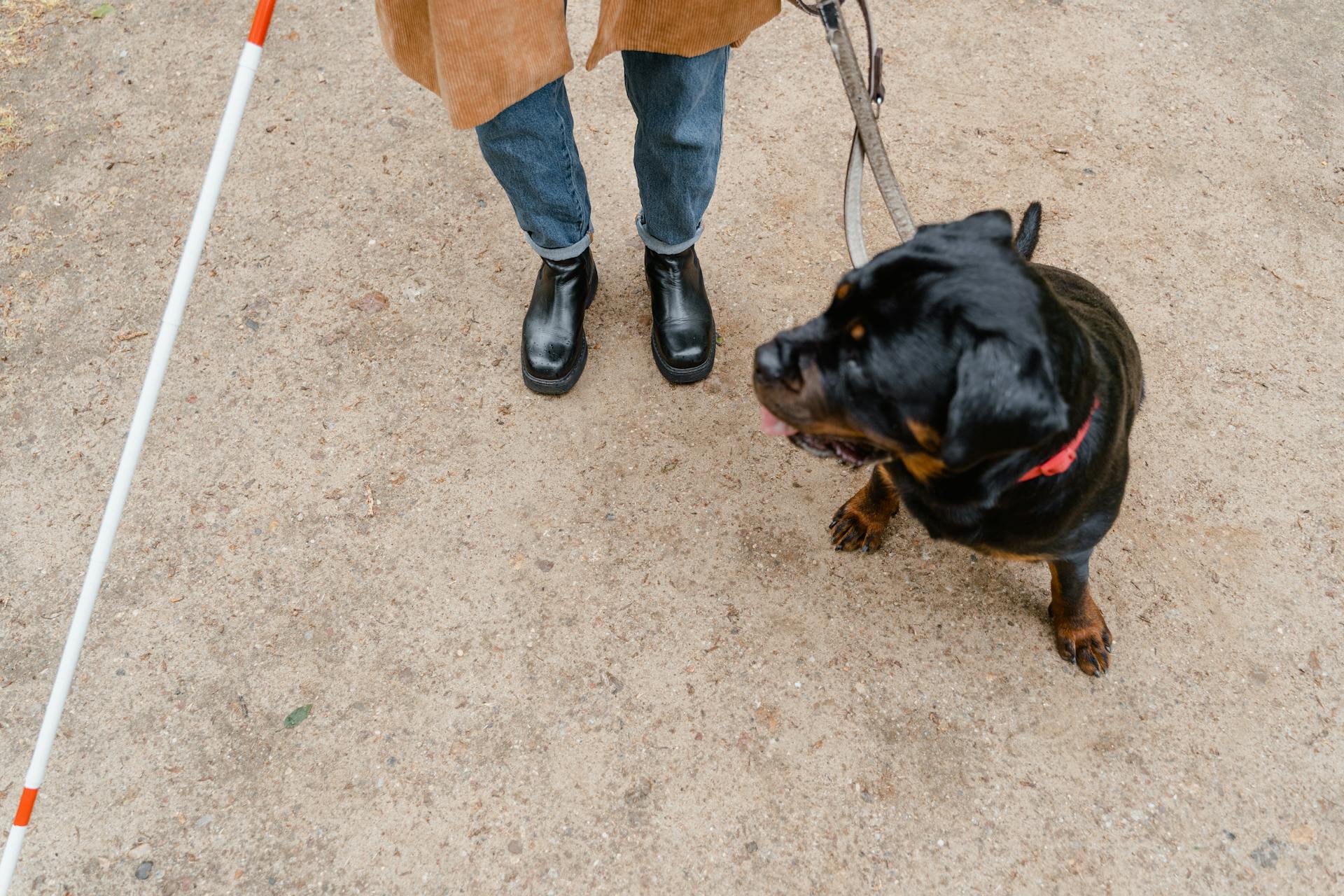
Service dogs are truly special companions, and their retirement is a significant milestone. According to our research, the average lifespan of a service dog is around 10-12 years.
As a service dog's career comes to an end, their owners must consider what's next for their beloved pet. Some service dogs may retire due to health issues or physical limitations.
Retirement can be a challenging transition for both the service dog and their owner. A study found that 75% of service dogs are retired between the ages of 8-12.
When Do Service Dogs Retire?
Service dogs retire after a long and dedicated career, but what does that mean exactly? A dog who retires had, at one point, everything required to be a service dog.
Retirement is not a one-size-fits-all situation, and it's different from being washed out or career changed. A dog who washes out is in one way or another unable to be a service dog.
A service dog's retirement is a planned transition, often due to age or health reasons.
Age and Retirement
As your service dog ages, it's essential to consider whether it's time for retirement. If your animal doesn't seem happy, experiencing mood changes, it could be a sign that they're ready for a less demanding schedule.
Age takes a physical toll on service animals, just like it does on humans. If your service dog can no longer keep pace with you or your daily activities, and you've ruled out potential medical conditions, age could be the cause.
Your service dog's health is crucial to its ability to work and function. If they have special health needs of their own, such as visual impairment, arthritis, or diminished kidney function, you need to consider whether they're healthy enough to perform their routine duties.
Cognitive deterioration is another sign that it's time to retire your service dog. If your dog becomes less responsive or begins to miss important commands or cues, the cause could be cognitive decline.
Here are some objective signs that may indicate it's time to retire your service dog:
- Your animal doesn’t seem happy (experiencing mood changes)
- Your animal can no longer keep pace with you
- Your animal has special health needs of its own
- Your animal shows cognitive deterioration
What Happens Next
When a service dog retires, the next step is crucial for both the dog and its handler. The options for a retired service dog's future are varied and depend on the owner's resources and circumstances.
You can choose to let your retired service dog live with you, preserving the companionship and emotional bond you've shared. Alternatively, you might rehome the dog with a trusted family member, making visits possible. In some cases, the dog may be returned to the agency or program that originally trained it.
Your decision should take into account your physical and emotional health, as well as those of your animal. If you're unable to care for an aged service animal, rehoming might be the best option.
Here are some possible outcomes for a retired service dog:
The Aftermath
The aftermath of a service dog's retirement can be a bittersweet time for their handler. Letting your service animal live out its retirement at home is a great option because it preserves the companionship and emotional bond that you already share.

You'll need to consider your physical and emotional health, as well as those of your animal, when deciding what to do with your retired service dog. Some owners will allow the animal to be rehomed with a trusted family member, making visits possible.
A dog who retires had, at one point, everything required to be a service dog, so it's not the same as being "washed out" or career changed. This means that many retired service dogs can still make great pets.
Many handlers keep their retired dogs as pets, but some may not have the funds or space to care for a pet dog. In some situations, owners may not be permitted to have a pet, even a retired service dog.
If the dog came from a program, it's often offered back to its original puppy raisers. There are also long waiting lists of people waiting to adopt these retired service dogs.
You might enjoy: Bichon Frise Not Groomed
Some Dogs Have to Be

Some dogs have to be retired. They still want to work, but they're no longer able to do their job safely and comfortably. This happened to my first service dog, Juno.
Your service dog may experience a sudden change in health, such as a genetic defect or a medical condition like sudden acquired retinal degenerative syndrome (SARDS). This can cause vision loss, making it difficult for them to navigate and perform their duties.
Age takes a physical toll on service animals, just like it does on humans. If your service dog can no longer keep pace with you or your daily activities, it could be a sign that they're ready for retirement.
Some common health issues that can affect your service dog's ability to work include visual impairment, arthritis, deafness, and diminished kidney function. These conditions can make it difficult for them to perform their routine duties.
Your service dog's behavior can also indicate that it's time for retirement. If they seem sluggish, depressed, or fail to greet daily routines with enthusiasm, it could be a sign that they're ready for a less demanding schedule.
Take a look at this: Tasks That Service Dogs Perform
Retired Service Dogs
Letting your service animal live out its retirement at home is a great option if you can provide the necessary care. This preserves the companionship and emotional bond you share.
Some owners may not be able to care for an aged service animal, so they'll rehome it with a trusted family member, making visits possible. This way, you can still see your beloved companion.
A dog who retires had everything required to be a service dog, unlike one who washes out due to inability. This distinction is important when considering your dog's future.
Ultimately, the decision of what to do with your retired service dog should take into account your physical and emotional health, as well as the animal's well-being.
For more insights, see: How to Care for Female Dog after Spay
Preparing for Retirement
If your service dog is showing signs of fatigue, it's time to reduce their workload and responsibilities. This can be a difficult decision, but it's essential to prioritize your dog's health and well-being.
Your service dog's happiness is a crucial indicator of their readiness for retirement. If they seem sluggish, depressed, or fail to greet daily routines with enthusiasm, it may be a sign that they're ready for a less demanding schedule. I've seen many dogs thrive in retirement, enjoying a more relaxed pace of life.
Aging is a natural part of life, and service dogs are no exception. If your dog can no longer keep pace with you or your daily activities, age may be the cause. This can be a signal that the time for retirement is near.
Here are some key indicators that your service dog may be ready for retirement:
- Sluggishness or depression
- Age-related decline in physical abilities
- Special health needs
- Cognitive deterioration
Listen to Your Heart
Listen to your heart when deciding when to retire your service dog. It's a personal decision that can be difficult to make, but ultimately, you know your animal best.
If you've been working with a service animal for a while, you've likely built a strong rapport and understand what's normal for your animal's behavior. This includes things like agility, attentiveness, appetite, and mood.

Making the decision to retire a service dog often begins with a gut feeling that your animal is showing signs of advanced age. This can be a subtle observation, but it's an important one to pay attention to.
For many owners, it's hard to put their finger on exactly why they feel it's time to retire their service dog. But with experience and a deep understanding of their animal's needs, they trust their instincts and make the decision to let their service dog retire.
She Wanted to Work
As we prepare for retirement, it's essential to consider our pets' needs, just like Juno's owner did. She still wants to work, despite being almost nine and completely blind in her left eye.
Dogs, especially dedicated breeds like Juno, can remain eager to work even in their golden years. This means we need to find ways to keep them engaged and active.
Juno's owner hands her leash whenever she's getting ready to go, showing how important it is to involve our pets in daily activities. This can be as simple as taking them for a walk or playing fetch.
Just because our pets want to work doesn't mean it's okay to let them. We need to ensure their health and safety are prioritized, especially as they age.
If this caught your attention, see: Dog Work
Frequently Asked Questions
Why do service dogs retire early?
Service dogs may retire early due to health issues or changes in their handler's lifestyle. This can include joint problems, vision impairment, career changes, or relocations that impact their ability to perform their duties.
Sources
- https://anythingpawsable.com/retiring-a-service-dog-faq/
- https://medium.com/@smccarthy5/how-do-service-dogs-adjust-to-a-life-after-retirement-a58995745b78
- https://bridgingapps.org/retired-service-dogs/
- https://figopetinsurance.com/blog/when-it-time-retire-my-service-dog
- https://growingupguidepup.org/service-dog-retirement/
Featured Images: pexels.com


